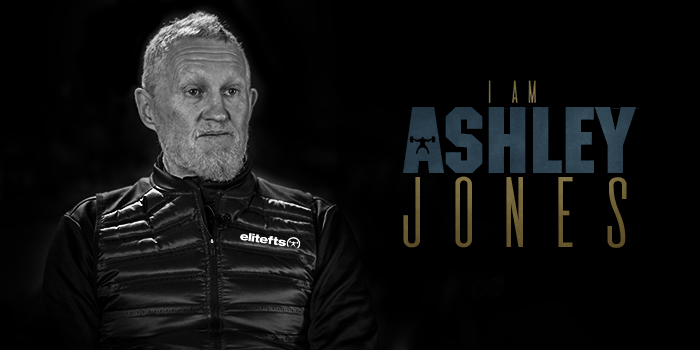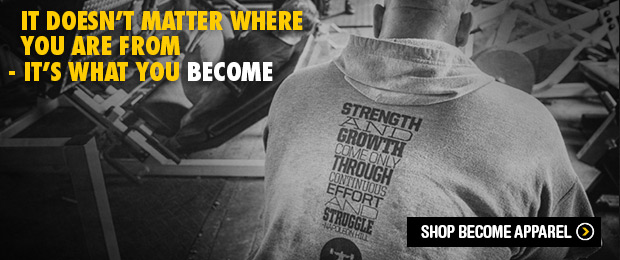
Interview conducted and written by Sydney Schulte & filmed by Josh Goedker
"My name is Ashley Jones, and I am a columnist at elitefts."
Ashley Jones is Celtic-Scandinavian by ancestry, Australian by birth, and a New Zealander by marriage and choice. He grew up near the northern beaches of Sydney, Australia, where he played sports.
His most recent coaching stint was with the Samoan Rugby Union for eight months with the goal of getting the team into the World Cup — and the team made it! At the end of the tour, he decided to part ways due to several factors. (If anyone’s hiring, Jones is open for ideas and opportunities.) He played rugby growing up.
Fortune was on his side as he was able to make a few representative rugby teams as a younger player. It was there he thought he was going to get into a higher representative honor. However, he thinks he matured too early as people caught up to him — and his shoulders took a beating over the years.
But that didn’t keep him out of rugby. Jones fought to stay involved in the sport he loved in one way or another. He chose to be a teacher, but after a few years into school, he realized that wasn’t what he wanted to do.
"I wanted to be a coach."
By 1980, he’d started reading articles from the National Strength and Conditioning Association’s journal. Suffice to say he was hooked. That journal changed the trajectory of his life. He went back to college to get his masters and coached as much as he could in-between. Then, in 1992, he landed his first professional coaching job.
"And I haven’t worked a day since then because I enjoyed it too much."
His first job, however, wasn’t in rugby. It was coaching basketball. He had a really good American coach named Bob Turner, who was with the Sydney Kings organization. The timing was lucky, as Jones had recently attended an NSCA conference and had seen what the United States was doing in terms of basketball coaching.
He was given a trial and did warm-up drills with the players. The owner, who had recently come back from the Lakers, saw what Jones had been doing and was impressed because he’d seen the Lakers go through the same drills. This assured the team owner that Jones knew what he was doing. Jones calls this a moment of “pure luck,” and without that moment, he isn’t sure if he would be where he is now.
His goal with the Kings was to get the players stronger, and the goal of making athletes stronger translated into each and every job that followed — and boy, did he have a lot of jobs. Jones had assumed he’d stay in Australia his entire life, but life always finds a way. Though that way may be different than you expect.
In 2003, he saw an advertisement for a coach for the Canterbury Rugby Football Union, a premier rugby team, in Christchurch, New Zealand. After a successful interview, Jones got the job and has been there more or less since — after coaching in other countries. Other than Australia and New Zealand, Jones has also coached in Japan, Scotland, and Samoa. He also lived in the United States for a little bit while working for the NSCA in Nebraska. He might have lived there longer if it weren’t for issues with his visa.
Overall, he attributes most of these jobs due to simply being in the right place at the right time — though it also helps to have connections. Who you know truly does make a difference. Living in other countries also made a difference in how he coached abroad and at home.
"Obviously, there are cultural differences everywhere, and even though you had a successful team culture in say, Canterbury, in Christchurch, to think you’re going to pick that up and transport that to another organization, or even within New Zealand, let alone overseas, is being foolish."
He’s heard horror stories, such as a team in Japan that had a strength and conditioning coach who basically destroyed the team culture within 12 months because he didn’t consider what the Japanese were like in the first place and what their culture had and brought to the strength and conditioning mix.
For Jones, it’s about having strong principles and knowing what you what to accomplish with the team, and knowing what the team personnel is like, and even with that, you may have to “chop and change.” He believes that in some cases, specifically with his experiences in Japan and Samoa, being able to speak as much of the culture’s language as possible.
"I think [speaking in another language] makes you a better coach when you go back to your native language because you have to get, in your own mind, 100 percent clear of what you expect and what you want because in some cultures, everything will be taken quite literally, whereas you can get away with some jokes as far as I’m concerned when you’re speaking your own language. If you’re not 100 percent clear, to get that translated, then as Bill Murray will tell you, 'Things get lost in translation.' In that regard, you really have to be right on the money as far as what you want done. Then when you come back to speaking English all the time, I think it makes you a lot better. I’ve gone back to the basics."
Going back to the basics is what Jones has really been pushing for, and it’s shown in the last couple articles he’s written at elitefts. Teaching in foreign countries made him really appreciate that strength and conditioning is a simple task when done right — and unfortunately, people tend to complicate it. But that’s not something Jones is afraid to tell people. In fact, he’s giving out entire programs on elitefts as well as extra information in the comment sections. So why does he give out so much information at no cost or benefit to him?
When he was very young and was a team captain on an under-17 Australia rugby team, there was a club captain whom he admired: Allan Norley. Norley had been very successful with his team, so Jones sent him a letter that said, “How do you lead men into battle in the sport, week in and out?” Jones didn’t expect a reply — after all, Norley was in his 20s or 30s and presumably far too busy to write back to a 16-year-old kid. But Norley replied. It wasn’t a one-page typed reply. It was an eight-page handwritten reply. That reply struck a chord in Jones.
Norley could have thrown it away without a single thought. But no, he took the time to write back to a teenager in excruciating detail. Not only that, but a few weeks later, Norley and his team played Jones’ club team. And once again, Norley reached out to Jones, telling him that even though he had club duties to respond to, but if Jones waited for half an hour or so, Norley would have a good chat with him. And so Jones did. Norley had to be pulled away to get back on the bus going back to the city because he spent all of that time — an hour and a half — talking to “some kid” (as Jones refers to himself) about how he approached the role of team captain.
"From that day on, I’ve always believed that if someone takes the time to read what I have to write —I’m still amazed to this day that people take the time to actually read the simple musings of a strength coach like myself — and then, to actually write a comment or ask a question for clarification, I think it’s what I need to do, to clarify some point of interest or to give information that hopefully can somehow make them a better coach or they can actually use the information to help someone else, I think that becomes almost generational. You might be the father of the article but then you become the grandfather or the great-grandfather of whoever’s reading it down the track. I think it’s more of an honor or a privilege to actually be able to help out that way."
That said, it’s no wonder Jones places Allan Norley at the top of the list of people who have inspired him — though that list continues to grow, even after 40 years of being in this industry. That said, he admits that when he’d started pro coaching, it was easy to get a job because it was a gig no one wanted.
And now, well, times are changing. It’s far more difficult to get a pro coaching job. There are fewer and fewer openings and more people going into the field. Simply put: there are not enough coaching jobs for all of the people who want to become coaches. The advice Jones gives to anyone who wants to become a coach is this:
"If I had my time again, I would do a science-related degree."
Science — nutrition and technology, specifically — and the strength industry are becoming more intertwined with one another. Jones isn’t suggesting that people should give up on their passions, but they should know it’s going to be hard, but to quote Dave Tate (and Jones does): “Passion trumps everything.”
"I would like to think that I’ve helped people cut the extras out of what needs to be done. What I hope to have achieved is to allow people to prioritize what’s important. What’s the 'why' of why we do something? If we don’t know the 'why' of why we do it, the 'how' and the 'what' comes pretty easily after that. That’s what I’d like to be most impactful for. I’d like to think the legacy I leave behind in this industry is that it doesn’t need to be complicated. That’s what I’m going to be pushing all the time now. Simplicity is not a dirty word, and if you try to complicate the issue, you’re basically lost. You should be trying to explain things as simply as possible. Even if some people think that it’s not that hard, then it is not that hard. You’ve got to keep thinking how simple this job is. The hard part is getting people to do unnatural things, to push themselves to those limits, those dark places, and that becomes more a psychology issue than a physiology issue. That’s the importance of the simplicity of programming but the complexity of getting people to want to do things."










I've followed Ashleys writing for some time and was absolutely struck when I met him last year whilst overseas on an S&C internship. I thought the chance encounter would be where the story ends, however, I was amazed to check my E-Mails the next day to see a message from Ashley. He had tracked down my contact details and offered his support through face to face Q&A's, in person shadowing and dropboxes full of accumulated resources.
Ashley - it's amazing to now hear the letter story from your youth and be fortunate enough to benefit from you 'paying it forward'. As per the advice you gave me, I now look to pay it forward to others!
Cheers,
Ben.